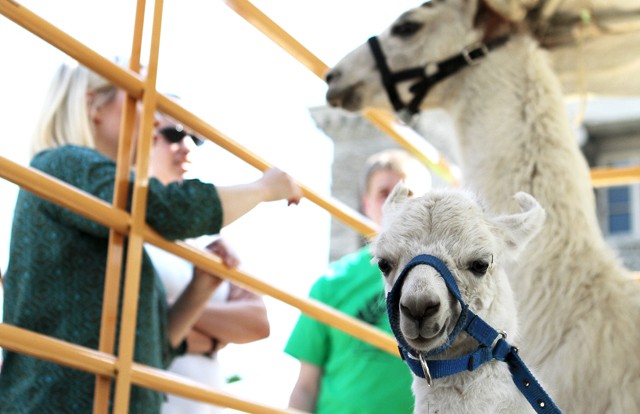As Mariah, a llama, defecated on Northrop Plaza, her owner Rick Carlson glanced into the pen. âÄúOh, their feces is completely odorless,âÄù he said. Carlson, owner of CarlsonâÄôs Llovable Llamas in Waconia, came to take part in Agriculture Awareness Day on Tuesday at the University of Minnesota. Members of the University Agriculture Education Club were joined by various members of more than 12 agriculture organizations to answer questions about their livestock and organizations. The organizations played games and gave away Frisbees, pens and other items for commercial purposes. On display were two cows, a pig, two llamas and 10 chickens to âÄúshow people where their food comes from and how it gets from farm to plate,âÄù said Jason Kaare, main coordinator of Ag Day and agriculture education sophomore. To make this day happen, Kaare had to apply for an outdoor permit to use Northrop Plaza, another to use animals and two food permits. âÄúItâÄôs really important for the public to know that farmers are producing safe and healthy food,âÄù Kaare said. âÄúAs the world population increases, the demand for food, fiber and renewable resources increases.âÄù Ag Day was completely student-run, and planning began in December. âÄúWho wouldnâÄôt stop to look at cows and llamas?âÄù first-year economics student Navita Lakhram said. âÄúI donâÄôt know much about food production, but having the animals and students here is a good way to teach the rest of us about it.âÄù According to Carlson, there are a lot of people who do not know about the role llamas play in agriculture production. âÄúLlamas are âĦ used for their wool, which is used for clothing and packaging,âÄù Carlson said. âÄúTheyâÄôre also low maintenance, are great at herding other animals, provide excellent fertilizer and are great at birthday parties.âÄù Lisa Marquette, a farmer from Buffalo, Minn., said she feels the same way about her more than 40 sheep. âÄúJust because you end up using the wool or eating it doesnâÄôt mean you canâÄôt give an animal a quality life,âÄù Marquette said. âÄúThere are farmers out there that are concerned about [animalsâÄô] well-being.âÄù Other students who were already interested in consuming local and organic food stopped by as well. âÄúI try to get organic stuff already,âÄù advertising sophomore Dan Erickson said. âÄúBut IâÄôm definitely interested in learning more.âÄù Part of the agreement with the University was that all animal waste would be transported to the St. Paul campus. âÄúWe know that some animal rights groups have a problem with a day like this,âÄù Kaare said. âÄúBut itâÄôs time for agriculture producers to get their side of the story out there. Food doesnâÄôt have to come from big processing farms.âÄù

Image by Mark Vancleave
Llamas interacting with students at Agriculture Awareness Day on Northrop Mall on April 20, 2010.
Ag Awarness puts focus on farming
U agriculture orgs. educated students with live animals on Northrop Plaza.
by Adam Daniels
Published April 20, 2010
0

